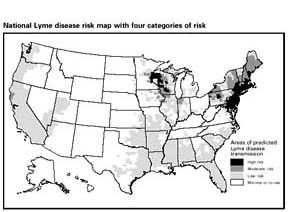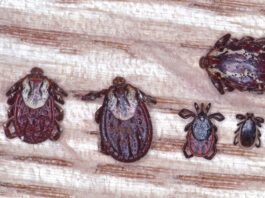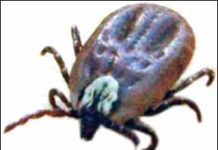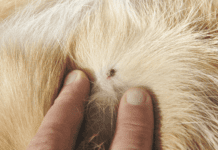Are Ticks Active in the Winter?
Even the most obsessive dog owners may let their flea-and-tick guard down when the winter winds kick in to save some time and money....
Essential Oil Tick Repellents: What Works and What Doesn’t
Far be it from us to tell you to put pesticides on your dog. But weve never heard of a single nontoxic preparation that was effective at keeping ticks off all dogs. For some dogs, only the potent pesticides seem to keep ticks away. There are, however, some nontoxic products both commercially produced and homemade formulas that work to repel ticks well enough to consider using them as part of a comprehensive Lyme disease prevention program.
New Lyme Disease Test for Dogs
Researchers at Cornell University's Animal Health Diagnostic Center have developed a new test for Lyme disease in dogs. Available as of June 15, the Lyme multiplex assay is capable of distinguishing between infection and vaccination when vaccination history is available, and between early and chronic disease stages, from a single blood sample. Borrelia burgdorferi, the bacteria that cause Lyme disease, migrate by way of the tissues to the joints, nervous system, and organs, causing fever, pain, lameness, and sometimes kidney failure (Lyme nephropathy). By the time these clinical signs show up, the infection may have been present 6 to 8 weeks or longer.
What do Ticks Look Like on Dogs?
Knowing how to identify tick bites, and properly treat them is an important part of caring for your dog and preventing tick transmitted diseases and other health issues.
Treatment and Signs of Parasites in Dogs
Parasites in dogs affect both the dogs internal organs like the heart and digestive system, their skin, and orifices like the nose and ears.
5 Steps to Safely Pull A Tick Off Your Dog
It's hard to say which is worse: running your hand over your dog and brushing against an attached tick, or seeing a tick skitter across your dog's face. Either way, the unwelcome arachnid must go. What should you do?
Babesiosis in Dogs
Babesiosis in dogs is a tickborne disease that attacks red blood cells over time gradually causing anemia. The disease is seen worldwide, and the infection is carried for a lifetime.
Tick Paralysis In Dogs
Tick paralysis starts five to nine days after the tick attaches and feeds. If the ticks transmitting the neurotoxin are not removed, your dog will eventually die due to respiratory failure.
Lyme Disease in Dogs
fatigue
How to Remove a Tick from a Dog
It’s a good idea to check your dog carefully for ticks after every outing. You may find loose ticks crawling through your dog’s coat....
New Flea and Tick Products Hit the Market
Lately, it seems like new flea and tick control products have been popping up left and right. I suspect this is due to some of the original patents running out. When a patent expires, other companies can create generic versions of the same product, usually for less money. This inspires the original companies to create new products that they can patent anew. In some cases, new products are introduced because fleas and ticks may be developing resistance to the older products, lowering their efficacy. Most new products, including all those introduced this year, are just new combinations of older ingredients. Here’s a rundown on these new options.
ProMeris Discontinued
Pfizer has announced plans to discontinue manufacture and sale of its flea and tick control product, ProMeris. Orders will continue to be filled until September 20, 2011. ProMeris was introduced in the fall of 2007, and touted as the first topical product to use metaflumizone. Pfizer gained control of ProMeris when it acquired Wyeth/Fort Dodge Animal Health in 2009. Pfizer is also the maker of Revolution, used to control fleas and one species of ticks, along with heartworm, ear mites, and sarcoptic mange.



















